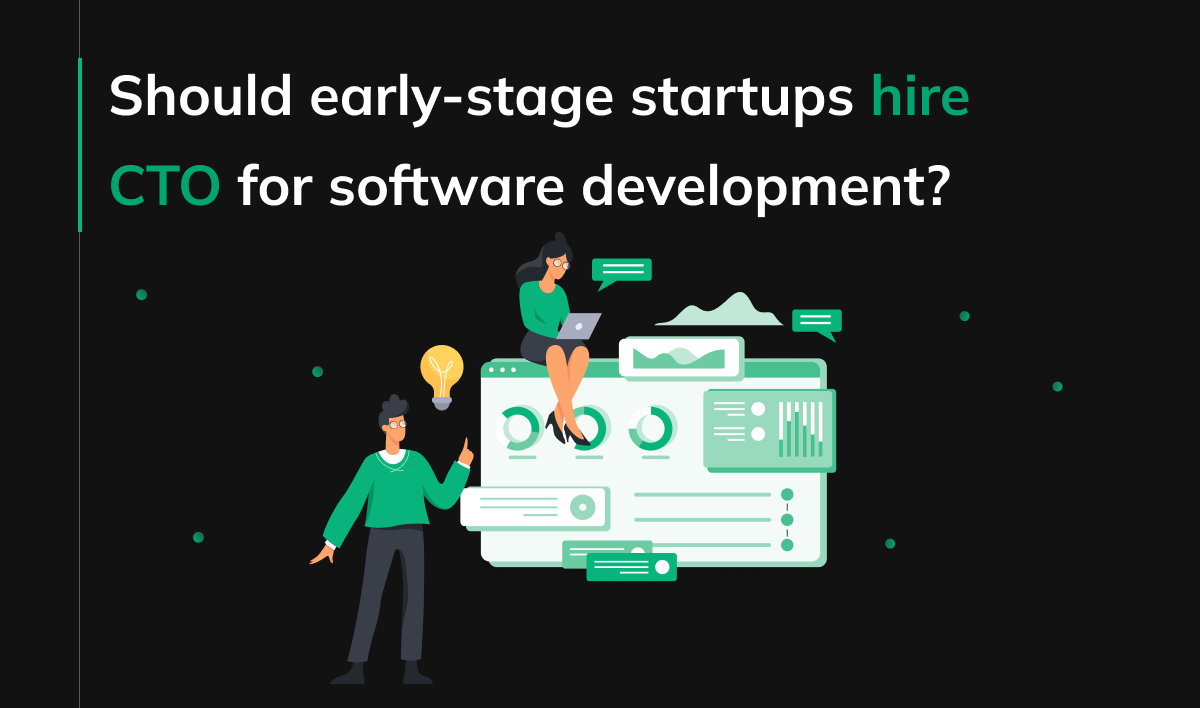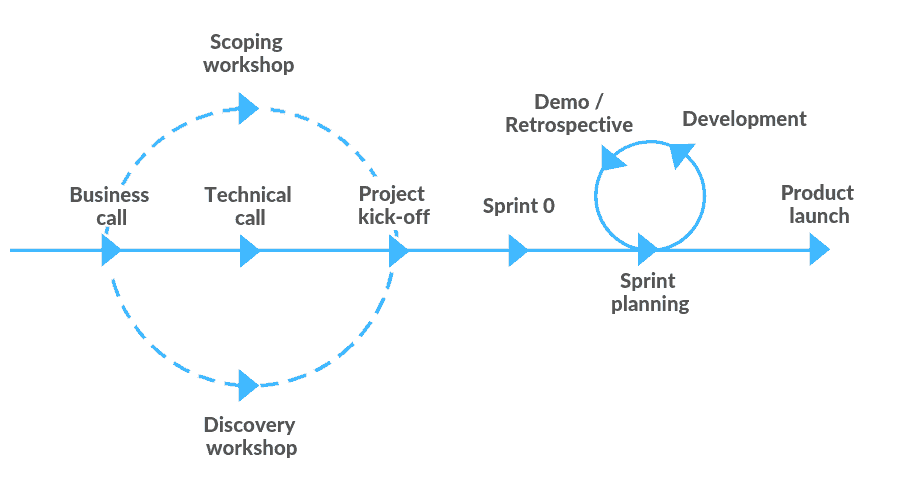Should early-stage startups hire CTO for software development?

In recent years software products businesses have become the most popular and most valued startups on the globe. Since the beginning of this incredible trend, the environment has created plenty of contradictory blueprints and methodologies on how to organize product development teams to launch faster and operate more efficiently. One of the examples is the never-ending dispute “to hire a CTO vs to outsource the technology part to an external company from the very beginning”. If you are the founder or CEO you’ll need to make this important decision someday. I am not waiting and gonna help you today!
What is the main goal of a startup at an early stage?
I can answer this question in two words: business strategy! There is some kind of misconception that startup founders should be perfect IT Project Managers focused heavily on technology, product features, and IT team building from the first day. I remind you that the biggest unicorns were not created because of technical skills – but rather because they have a great idea, appropriate business goals, and a sense of customer needs.Managing the development team, solving day-to-day problems, building processes, and clarifying requirements is a job that needs to be done but is pretty distracting for startup founders who should focus on more important aspects of startup development at this stage. What I’m trying to tell you is that business strategy should always be done before you’ll invest your time and money to hire a CTO or external development team. And when that moment comes, who do you choose? I give you a hint in the following paragraphs.
Who do the early-stage startups hire as a CTO?
Early-stage startups usually hire CTOs with a skillset in web development, software development, and project management. They also choose an experienced developer with a corporate background as their CTO. Ex-Google, Ex-Amazon, Ex-IBM, etc. – that sounds like a great choice for a startup CTO, but in most cases, it is not, especially when someone has only a corporate experience in that role. Corporates have totally different needs and challenges than early-stage startups.
The startups’ needs are about scaling and low-cost development. Meanwhile, the corporations focus on high-quality, maintainable, efficient code with a team of experienced developers in their own time zone. Startups usually don’t have the time, budget, and patience for that. Corporates know how to build software methodically but startups can’t afford this luxury right now; later there will be plenty of time for methods/processes once the product market share will be established.
Although corporate experience might be helpful in the startup world, and not all ex-corporate employees have a fixed corporate-like mindset, hiring an ex-corporate developer as a startup CTO might be risky.
Another scenario that startups often choose is promoting their first developer to a CTO role. This is usually not a good idea as well. Unless the original developer was involved in startups previously and understands how startups work, it might be hard to build relationships with investors or acquire new customers without having specific skillsets that can help startups grow faster than ever. Wide experience, team building & management skills, and a business-oriented mindset are crucial in a CTO role at this stage, so excellent technical skills aren’t enough to fulfill that role efficiently.
Let’s go back for a moment to what is most needed for an early-stage startup – skills in low-cost web development, software development, and project management. All of that could be easily outsourced. But if startups want to successfully outsource their product development at an early stage, it will be most important to find the right partners. Founders should focus on finding companies that can provide end-to-end product development services, take ownership of the outcomes, and especially have proven experience in helping startups at the early stage of their life-cycle in the past.
What is the perfect profile of the CTO for a startup?
This is a very important question to be answered before moving forward. We’ve seen many unfortunate projects that ended in never-ending CTO’s recruitment cycles. Although there are probably dozens of skills and factors to take into account, my experience shows that the most significant one is a proper business-oriented and product-oriented mindset.
Why? – you ask. Because early-stage startups just need to focus on their DNA – the core of what they do, not just technology or new ideas that aren’t fully developed yet. This means startups should minimize costs and risks by launching products quickly in a Lean/Agile way. The idea is to use minimal resources for maximum reward so startups can be cash positive faster while preserving equity for all stakeholders including founders, employees, investors, and customers.
What startups need more than anything is somebody who will develop prototypes quickly so they can validate their business hypothesis as soon as possible – without spending too much time/money. When startups get validation from users through validated learning (research based on actual customer feedback), it gives them confidence that moving forward will have good results! And this is what every new startup needs right now: people who know how to build up strategies that allow startups to grow faster than ever before while maintaining control over a tight budget and short deadlines. Who can do that better than people who did it many times in the past?
Early-stage startups are mainly focusing on product development (business) rather than technology per se. Even when they do have tech people in their teams, these engineers are usually working more as individual contributors without any formal responsibilities or accountability towards other members of the company; so it’s better to hire someone who has a deep understanding of how startups operate and can communicate well during meetings with founders about the progress.
This stage in the startup life-cycle usually lasts for a couple of months but usually less than two years – so it is relatively short. Hiring a full-time CTO with this skillset just for a couple of months might be overhead. Especially if at the next stages of startup development, the CTO’s skills will be much different.
Should early-stage startups hire a CTO anyway?
The answer is not easy. As I’ve already elaborated in previous paragraphs, finding a perfect candidate usually takes a lot of time and can be very costly. The software market trends and history of the most successful products suggest that there is an alternative. More and more founders are making the decision to use professional software companies to deliver full projects and provide consulting to the founders regarding best practices and technologies. All of this is because such companies have the experience, knowledge, and full set of resources needed to launch your entire product.

Whereas startups are mainly focusing on product development (business) rather than technology per see, they need someone who understands how startups operate and communicate well during meetings with founders about progress to ensure successful partnerships. This team will also be able to quickly develop prototypes to validate business hypotheses without spending too much time or money so startups can get validation from users through validated learning (research based on actual customer feedback). There needs to be somebody who knows what it takes for startups to grow faster than ever before while maintaining control over the budget and tight schedule.
End-to-end product development companies with wide experience in startup development and consulting can take care of software development for startups at the early stages. In such a case, startup founders can focus on business hypothesis validation by talking to their users to collect valid feedback, building their business structures (sales, marketing, etc.), and identifying skill gaps in the organization in order to fill them by hiring new people or outsourcing work. And most importantly, they can secure funding for the next stages of startup development. Startups should build a lean team with a CTO skillset only when they are ready for it – as an advanced-stage startup company. This strategy will help startups grow faster than ever with much lower risk!
If you found this article valuable and would like to learn about CTO vs Product Owner difference, do not miss this article that answers the question of why you should hire a Product Owner for your startup.
Check our dedicated services of software development for startups, and learn how we can become your CTO as a service.




